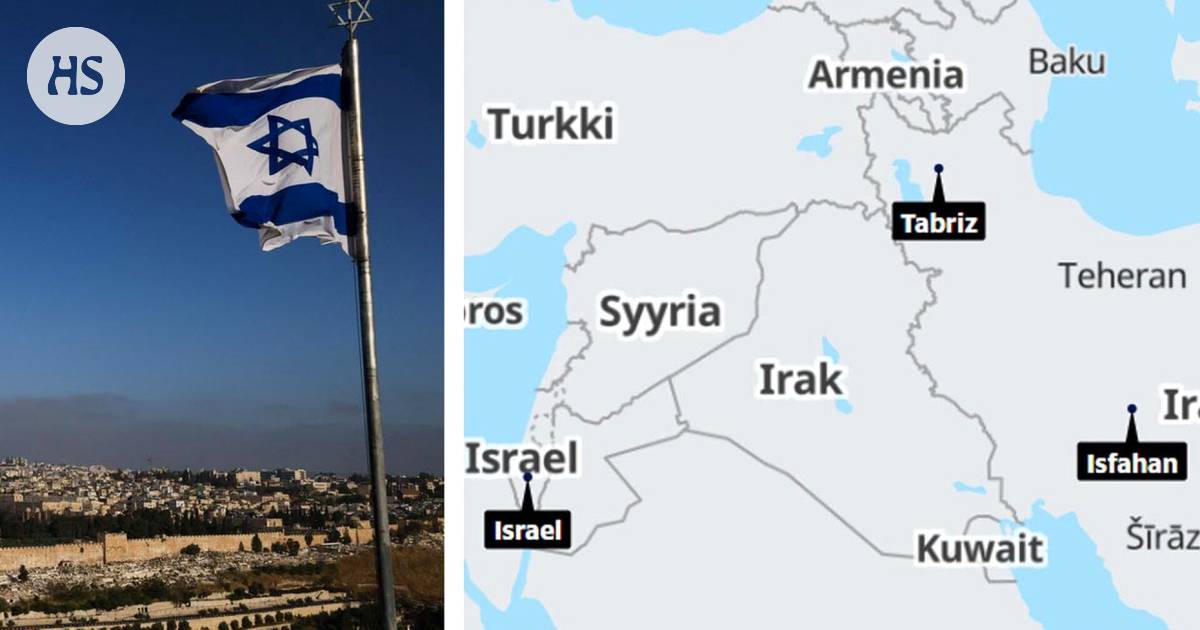Early on Friday, Israel launched its expected counterstrike against Iran. HS compiled what is known about it for this article.
of Israel reportedly launched its expected counterstrike against Iran early Friday.
by ABC News and CBS News US sources and The New York Timesin Israeli defense sources have confirmed the strike. The Israeli Armed Forces have not yet commented on the matter.
There is no confirmed information about the extent of the attack. However, according to several sources, the attack or an attempt to do so would have targeted the vicinity of an air base near the city of Isfahan.
An Israeli official source said The Washington Postillethat the purpose of the attack was to demonstrate that Israel is capable of carrying out an attack inside Iran.
According to Iranian state media, the attacks have reportedly not caused much damage. An Iranian official told the Reuters news agency that Iran is not planning immediate retaliation against Israel.
Iran’s state media reported explosions or their sounds near Isfahan, according to news agency AFP. According to ABC, it would have been missiles.
Reuters’ Iranian source denies the missile strike. According to an unnamed Iranian official, there is no confirmation of a foreign attack, or at least from abroad, and it appears to be more of an “infiltration” than an actual attack.
Iranian commander Siavosh Mihandoust said the sounds in Isfahan were caused by the activation of an air defense system. Iranian officials said that the air defense shot down the planes.
According to Iranian state media, the missile defense system was not activated.
The International Atomic Energy Agency (IAEA) has said that the attack did not cause any damage to Iran’s nuclear facilities. UKMTO, which monitors British trade routes, also said there were no indications of attacks on commercial ships.
Iran’s anti-aircraft armament near the nuclear facility in Isfahan, pictured on Friday.
Why did Israel attack Iran?
Israel wanted to respond to Iran’s 13-14 to the large-scale missile and drone attack carried out in April. Air defenses by Israel and its allies destroyed almost the entire attack.
With its attack, Iran, on the other hand, wanted to avenge the attack on Damascus, Syria, on April 1, in which seven members of the Iranian Revolutionary Guard were killed.
The Revolutionary Guards who died in the attack on Damascus, Syria, were remembered in Tehran on April 4. In the foreground, Iran’s supreme religious leader Ali Khamenei.
Thus, Israel’s strike on Friday is already the third event in a cycle of counterstrikes between Israel and Iran.
Israel’s most influential ally, the United States, Western countries and many Arab countries have already asked the parties to calm down in order to prevent the Middle East conflict from escalating further.
Director of the Middle East Institute Susanne Dahlgren not Friday morning In an interview with HS believed that the conflict would expand into a full-scale war.
The Israeli flag flew in Jerusalem on Friday. Al-Aqsa Mosque can be seen in the center of the picture.
How has the world reacted to the situation?
Visiting President of the European Commission in Finland Ursula von der Leyen demanded on Friday that Iran and Israel and their allies avoid escalating the situation. Prime minister Petteri Orpo (kok) stated that the situation is now very dangerous.
Chancellor of Germany Olaf Scholz said that easing tensions will be discussed “with friends and allies”.
Britain, France, Turkey, Russia, Japan and China have also called for relaxation. Spokesperson for the Chinese Ministry of Foreign Affairs Lin Jian said, according to AFP, that China is acting as a “constructive” party in the situation.
Italian foreign minister leading the meeting of the G7 countries Antonio Tajani also demanded an “unconditional” easing of tensions in the Middle East.
The United Arab Emirates, which has a neutral attitude towards Israel, called for “extreme restraint” to avoid repercussions. The Arab country Oman, on the other hand, condemned “Israel’s repeated attacks on the region” and Egypt warned of the consequences if the conflict expands.
The United States has called on the personnel of its embassy in Israel and their families to limit their movements.
Several media reported that the United States had received information about the attack in advance. The US and Israeli defense ministers discussed Iran’s “destabilizing actions” the night before the attack, The New York Times told.
Decades of shadow war
The attacks by Israel and Iran have been seen as a turning point that threatens to end the decades-long “shadow war” of the countries of the Middle East and start open warfare.
About this let’s use graphics to tell what kind of relations Iran and other Middle Eastern countries have with Israel.
The timeline compiled by HS below shows the main tensions between Iran and Israel from the 1970s to the 2020s.
